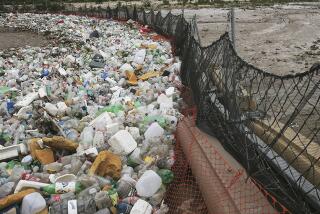Plant Growth : Maquiladoras’ Appeal Hasn’t Waned Despite Problems
- Share via
TIJUANA — Baja California is attracting another wave of Asian, particularly Taiwanese, manufacturers, despite inadequate infrastructure, planning and regulation, problems exemplified by a major fire last week at a Tijuana toxic-waste recycling plant.
No one was hurt in the accidental blaze, which occurred in an industrial zone, but it consumed 200 tons of toxic waste and sent noxious clouds over nearby residential areas and runoff into the Pacific Ocean.
The incident raises anew questions of the government’s handling of the explosive growth in maquiladoras, the foreign-owned plants that take advantage of cheap labor and favorable tax laws to make mainly export products. Tijuana’s roads, housing and city services are stretched thin because of a surging population.
Undaunted, foreign manufacturers keep coming. Among the latest is ADI of Taiwan, the world’s fifth-largest maker of computer monitors, which said this week it will build a $70-million manufacturing complex, its first North American facility, either in Tijuana or Mexicali, capital of Baja California Norte. Production at the plant, to employ 500, could begin by year’s end.
ADI sells its own branded line of monitors in the United States and Europe but is also a major supplier to Compaq, the world’s largest maker of personal computers.
Like other Asian electronics companies, ADI is responding to NAFTA requirements that products sold in the U.S.-Mexico-Canada trade region also be manufactured here to get favorable duty treatment. To qualify under the North American Free Trade Agreement, all television and computer manufacturers must make monitors in North America by 2001.
So the same forces that brought Japanese and Korean television manufacturers Sony Corp., Hitachi, Samsung and others now pull Taiwanese computer companies such as Acer, Mac Technologies and ADI. Acer and Mac both recently acquired plant sites in Mexicali.
Other Asian firms are poised to
relocate or expand in Baja, including Nippon Electric Glass, Sharp and Mitsubishi, all of Japan, sources say. Corning Inc. of the United States, Samsung of Korea and Asahi of Japan also are expected to team up for a glass factory in Tijuana or Mexicali.
Baja California has seen employment in the state’s maquiladoras rise to 180,000, up 15% from a year ago, said Jorge Gallego, Baja’s director of economic development.
The pressures this growth has placed on Baja California’s infrastructure were graphically demonstrated by the July 6 fire at a plant run by El Cajon-based Pacific Treatment Environmental Services.
The fire consumed mainly paint, solvents and thinners and contaminated soil collected from maquiladoras and stockpiled by the firm. Prevailing winds blew the toxic clouds south and east over poor, densely populated residential areas adjoining the industrial zone, Tijuana fire chief Carlos Gopar said.
San Diego water officials said the Tijuana toxic-waste recycling plant, one of 16 licensed by the Mexican government, did not have a sprinkler system or an adequate way to store firefighters’ runoff--contingencies required of toxic recyclers in California. Pacific Treatment executives did not return phone calls this week.
Powering Up
The Mexican government this week awarded a $244-million contract to a Swiss-Japanese consortium to build a power plant in Rosarito, 23 miles south of the U.S.-Mexico border, that will add 540 much-needed megawatts to Baja California’s power grid.
The plant, to be completed in 2001, will serve more than 1 million households in the greater Tijuana area. Asea Brown Boveri of Switzerland and Nissho Iwai of Japan will build and finance the plant, then lease it to the Mexican government for 15 years before handing over ownership.
The new plant may replace Rosarito’s heavily polluting 600-megawatt facility that burns fuel oil, or supplement it if the old one is refurbished.
The plant will burn natural gas, which is cheaper and cleaner but is not available in Tijuana. To remedy that, the Mexican government will probably invite bids later this year for a natural gas pipeline from the U.S.-Mexico border to Rosarito. A consortium led by Enova of San Diego, Pacific Enterprises of Los Angeles and Proxima of Mexico might bid on that project.
Chris Kraul can be reached at chris.kraul@latimes.com
More to Read
Inside the business of entertainment
The Wide Shot brings you news, analysis and insights on everything from streaming wars to production — and what it all means for the future.
You may occasionally receive promotional content from the Los Angeles Times.










